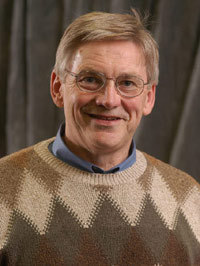
John Van Engen, Andrew V. Tackes Professor of History, has been awarded both the John Gilmary Shea Prize from the American Catholic Historical Association (ACHA) and the Philip Schaff Prize from the American Society for Church History (ACSH) for his book “Sisters and Brothers of the Common Life: The Devotio Moderna and the World of the Later Middle Ages.”
The John Gilmary Shea Prize is an annual award given to a book judged by a committee of scholars to have made the most original and distinguished contribution to knowledge of the history of the Catholic Church. In presenting the award, this year’s judging committee declared, “Van Engen’s book succeeds admirably at showing us why the devotio moderna was important, presenting what has been done on it to date, then exploring new paths to a fuller understanding of the subject.”
The Philip Schaff Prize is awarded to the author of the best scholarly book that presents original research on any period in the history of Christianity or makes a significant synthesizing scholarly contribution. “Exceptionally erudite, well researched, and clearly written, this book will surely become the definitive work on the devotio moderna,” said the ACSH Research Committee when announcing the award.
“The award of the Shea prize, along with the Philip Schaff Prize, signals John Van Engen’s pre-eminence as an historian of the medieval church,” says Thomas Noble, professor and chair, Department of History. “His work has extended from the 12th century world of Benedictine monks to the 14th and 15th century world of pious lay communities, from Latin churchmen to Dutch-speaking men and women, from institutions and theology to social movements and daily life.”
Beginning in the 1380s in market towns in the heart of the Netherlands, the devotio moderna, or modern devout, formed households organized as communes and took up lives of private devotion. They refused to profess vows as members of any religious order or to acquire spouses and personal property as lay citizens. The movement grew in spite of opposition, spreading outward toward Münster, Flanders and Cologne.
In “Sisters and Brothers of the Common Life,” Van Engen shows the devotio moderna in their humanity, communities and beliefs, and places them within the context of the urban societies of the Low Countries and late medieval cultures.
Van Engen is an historian of religious and intellectual life during the European Middle Ages. Within this thousand-year period, his work focuses particularly on “Christianization” in Medieval European history broadly and religious movements in the later Middle Ages. He currently is translating from Middle Dutch the works of Alijt Bake, a previously unknown female mystic, and has also begun a work on 12th century reform and renewal tentatively titled “The Spirit of the Twelfth Century.” He plans to publish a second book on the devotio moderna sometime this year.
Van Engen joined the faculty at Notre Dame in 1977 and from 1986 to 1998 served as director of Notre Dame’s Medieval Institute, the largest contingent of medievalists of any North American University. In 2008, he was president of the American Society of Church History, an organization dedicated to the scholarly study of the history of Christianity and its relationship to surrounding cultures in all periods, locations and contexts.
Contact: John Van Engen, 574-631-5062, vanengen.1@nd.edu